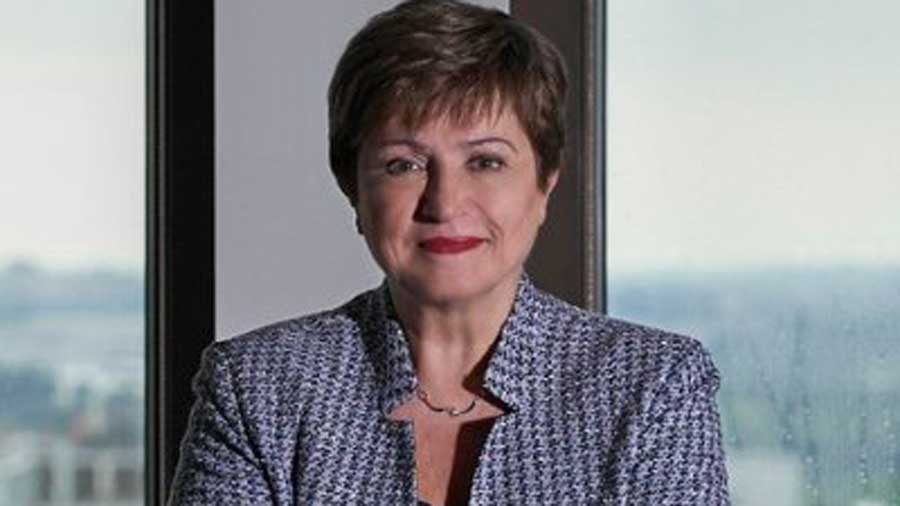The IMF’s executive board on Monday expressed confidence in the leadership of Kristalina Georgieva, its managing director, following allegations that she had manipulated data to placate China when she was a senior World Bank official.
The decision came less than a month after an independent inquiry commissioned by the World Bank concluded that she played a central role in meddling with its 2018 Doing Business survey.
The findings raised questions about her judgment and ability to continue leading the IMF. But ultimately its executive board decided that the investigation into Georgieva’s actions “did not conclusively demonstrate” that she had acted improperly.
“Having looked at all the evidence presented, the executive board reaffirms its full confidence in the managing director’s leadership and ability to continue to effectively carry out her duties,” the IMF’s executive board said in a statement.
“The board trusts in the managing director’s commitment to maintaining the highest standards of governance and integrity in the IMF.”
Georgieva, a Bulgarian economist, maintained strong support from many of the IMF’s shareholders, including France, which had lobbied hard for her to get the job in 2019. The US, which is the fund’s largest shareholder, declined to express public support for her following the allegations but ultimately did not call for her removal.
Treasury secretary Janet L. Yellen spoke with Georgieva on Monday and told her that the World Bank investigation into her actions “raised legitimate issues and concerns”, the treasury department said.
Yellen said, however, that absent “further direct evidence” regarding Georgieva’s role in data manipulation at the World Bank, there was no basis for a change in leadership at the fund, according to a readout of the call.
The outcome could lead to political repurcussions for the Biden administration. Republicans and Democrats in Congress had urged Yellen to insist on “full accountability” after it emerged that Georgieva had instructed staff to find a way to ensure that China’s ranking did not fall in its report on business climates.
The Biden administration and lawmakers from both parties have been concerned about China’s growing economic clout and influence in multilateral institutions.
Treasury Department officials debated the gravity of the revelations for weeks, insisting publicly that the process of reviewing Georgieva’s actions at the World Bank should be allowed to play out.
The World Bank’s Doing Business report assessed the business climate in countries around the world. Developing countries, in particular, cared deeply about their rankings, which they used to lure foreign investment.
At the time of the reported manipulation, World Bank officials were concerned about negotiations with members over a capital increase and were under pressure not to anger China, which was ranked 78th on the list of countries in 2017 and was set to decline in the 2018 report.
According to the investigation, the staff of Jim Yong Kim, then the bank’s president, held meetings to find ways to improve China’s ranking. Ms. Georgieva also got involved, working with a top aide to develop a way to make China look better without affecting the rankings of other countries.
The investigation found that Ms. Georgieva was “directly involved” in efforts to improve China’s ranking and at one point chastised the bank’s China director for mismanaging the bank’s relationship with the country.
Last week, the I.M.F.’s executive board spent hours interviewing officials from the law firm of WilmerHale, which conducted the World Bank’s investigation. They also interviewed Ms. Georgieva, who criticized the process of that investigation and insisted that she had acted appropriately.
“The WilmerHale Report does not accurately characterize my actions with respect to Doing Business 2018, nor does it accurately portray my character or the way that I have conducted myself over a long professional career,” Ms. Georgieva said in a statement to the board; it was obtained by The New York Times.
Georgieva was a longtime World Bank employee who rose through the ranks to become its chief executive. She previously served on the European Commission — the European Union’s executive body — and she has a Ph.D. in economics from the University of National and World Economy in Sofia, Bulgaria, where she also taught.
Georgieva said in a statement on Monday night that the episode had been difficult for her personally and that she was grateful the I.M.F. board had expressed confidence in her leadership.
“I am pleased that after a comprehensive, impartial review of the facts, the I.M.F. board agrees that the allegations were unfounded,” Ms. Georgieva said. “Trust and integrity are the cornerstones of the multinational organizations that I have faithfully served for more than four decades.”
New York Times News Service











